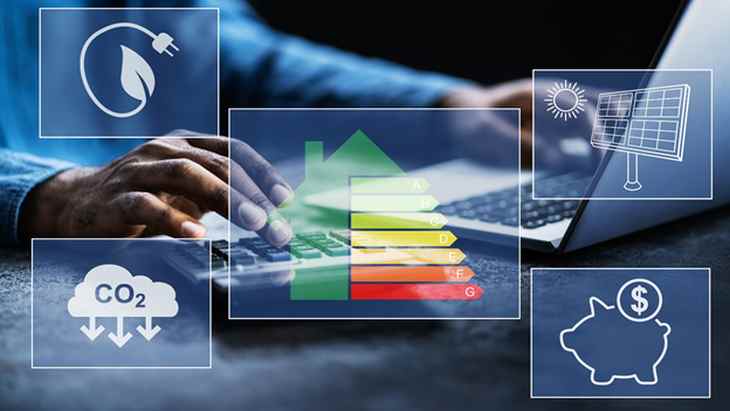The Federation of Associations of Energy Utility Companies (ACUE) today launched the “Energy Efficiency in Smart Homes, Smart Buildings and Smart Networks” project, financed with the support of grants awarded through the Norwegian financial mechanism 2014-2021, within the “Romanian Energy Program.”
Energy efficiency has become a priority at European level, with obligations to reduce consumption at peak hours being introduced. Consumers in Romania rallied to these targets and already reduced consumption last year by 9.3% for electricity while for natural gas consumption decreased by 16%. But so that these savings in the household segment are not temporary or contextual, they need to be reinforced by systemic solutions in terms of energy efficiency. The crisis proved that reducing energy consumption by eliminating waste is a resource in itself.
The project that ACUE implements in partnership with the Association for Clean Energy and Combating Climate Change aims to prepare the widest possible audience to adopt the best solutions that ensure energy comfort, but with a lower consumption of resources.
“We applied for the financing of this project last year, in the midst of the energy crisis. The data on which we based the activities showed that Romania has a low degree of efficiency in the use of energy resources: a third of the households in energy poverty, approximately 77% of the total area of the building fund must be renovated by 2050, and the distribution network must be designed so that it can effectively integrate the wave of prosumers and producers from renewable sources. Along with public initiatives, a coherent legislative framework, a good coordination and correlation of the programs that encourage the production of green energy with the investments necessary for the networks for their effective integration, there is also a need for a change in behavior in everyday life. The association of energy economy with rationing can be reduced with a good and correct information to consumers on solutions to eliminate energy waste without giving up comfort,” said Daniela Dărăban, Executive Director of ACUE.
The ACUE project plan includes 10 events dedicated to household consumers, public institutions and those interested in producing energy from renewable sources that can be efficiently integrated into distribution networks, supported by information campaigns focused on awareness of energy waste, on solutions at hand regarding reducing consumption without reducing energy comfort.
“It is a reality that European countries that total 80% of the total European consumption of natural gas in the residential sector have already decided to ban the use of natural gas in new buildings, if the new buildings are not connected to a centralized heat supply system. It is a fact that last year more than 3 million heat pumps were sold and installed in Europe. It’s a proven fact that well-insulated homes can only use a third of the energy used by uninsulated homes, with a major effect on people’s bills. It is a reality that we need to install many more smart meters. In general, the improvement of energy management knowledge to which our project aims to contribute is the foundation for improving energy efficiency,” said Răzvan Nicolescu, President of the Association for Clean Energy and Combating Climate Change.
8 out of 10 buildings need energy refurbishment
The ACUE project develops on 3 main pillars of action with an emphasis on the residential sector, public institutions and the efficient integration of renewable energy into distribution networks.
The greatest savings potential is found in buildings, whose proper insulation can bring savings of up to 40-50% of consumption, depending on the type of building. Each year, only 1% of the existing building stock undergoes energy renovations. Romania is included in this statistic, where 8 out of 10 buildings need thermal refurbishment, being built before 1980 and approximately 1.3% of blocks are renovated annually. Public buildings are responsible for approximately 40% of energy consumption recorded at national level. Therefore, energy efficiency in public institutions is particularly important, and through this project ACUE aims to contribute with expertise so that public authorities can choose the best efficiency solution adapted to local communities.
Intelligent energy distribution systems that integrate renewable sources – a priority
As the appetite for the integration of renewable energy resources grows exponentially, it is imperative to have efficient distribution networks, through investments that ensure the uptake of clean energy but also secure its supply to customers during peak solar and wind production periods.
“Green energy must reach the final customers in an efficient, safe and uninterrupted manner. Shifting the energy mix to a climate-sustainable configuration is a necessary but not sufficient condition. We are convinced that the way the infrastructure will adapt to meet the requirements to transport and distribute new sources of energy will dictate the pace and direction of the energy transition,” added Livia Stan, Director of Public Policy and European Funds within the E.ON group Romania.
The ACUE Federation started the development of the project “Energy efficiency in smart homes, smart buildings and smart networks”, co-financed within the Energy Program in Romania – Innovation Norway, SGS 4 Training and awareness raising, according to contract no. 2022/346702 concluded with Innovation Norway on March 22, 2023. The total eligible value of the project is of 222,000 euro, of which the non-refundable financial assistance is of 199,800 euro. The deadline for implementing the project is December 31, 2023.
The general objective of the project is to increase the level of information of different categories of actors, regarding 3 pillars:
- How can energy efficiency be increased in homes?
- How can the energy efficiency of public sector buildings be improved?
- How can sustainable energy distribution systems be developed that integrate renewable energy sources?
